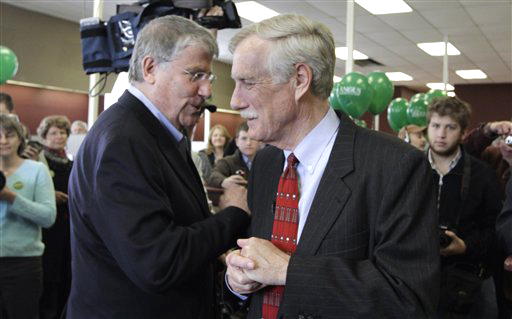PORTLAND — Six Republicans and four Democrats are scrambling to round up votes for Tuesday’s primaries in the battle for the seat being vacated by U.S. Sen. Olympia Snowe. But one candidate who’s getting much of the attention, Angus King, won’t be on the ballot since he’s running as an independent.
While party candidates have been appearing in debates and forums on TV and radio ahead of the primaries to determine who will be the party nominees in the general election, King has been working largely under the radar — raising money, enlisting volunteers, hiring staff, meeting with community groups around the state and getting his campaign organization into place.
Even though he’s considered the favorite in November’s general election, King, a popular former two-term governor, isn’t taking anything for granted, said campaign spokeswoman Crystal Canney. He has no special plans for primary day, intending to meet with supporters and staff at his campaign headquarters in Brunswick.
“We’re working this campaign as if we were 20 or 30 points behind,” Canney said. “In terms of name recognition, we’ve been out there reminding people who Angus King is.”
King’s been in this position before, running as an independent for governor in 1994. For the primaries that year, five Democrats and eight Republicans ran for their party nominations.
Joseph Brennan, a former Maine governor and congressman, won the Democratic nomination. Susan Collins, who is now serving her third term as a U.S. senator, was the Republican nominee.
King, who declined to comment for this story, was a political neophyte, although he had a following of some sort after serving as host of the “Maine Watch” public affairs show on Maine Public Broadcasting Network for 18 years.
While there are similarities between 1994 and 2012, one huge difference is King’s name recognition, said Dennis Bailey, who was King’s press secretary for his campaign and later while he was governor. Bailey is not affiliated with King’s Senate campaign.
Back then, King had a name recognition level of 9 or 10 percent, Bailey said. To get his name out, he aired TV commercials early in the campaign and didn’t let up until the election.
King’s name recognition now “is slightly below God,” Bailey said. “And people like him. How many politicians do people really like? They like him and they trust him.”
King eked out a win in the 1994 gubernatorial election and was re-elected in 1998 with nearly 59 percent of the vote, 40 percentage points ahead of his top challenger.
King has been dubbed the early front-runner for the Senate race, something that’s not lost on the party candidates.
In the campaign leading up to Tuesday’s primary, Republican candidates — and Democrats to a lesser extent — have been taking aim as much at King as each other. Republicans are calling him a Democrat in independent’s clothing, while Democrats have called him opportunistic.
King’s mere presence has changed how national Republican and Democratic party operatives view the race, said University of Maine political science professor Mark Brewer.
“The minute Olympia Snowe announced she wasn’t going to seek a fourth term, the Maine Senate race went to close to the top of both the Democrats’ and Republicans’ lists for the fall of 2012,” he said. “The minute Angus King said he was getting into the race, it fell right back down the list.”
The Maine Democratic Party has yet to formulate a strategy or a timetable on its role in the Senate campaign. That’s not because of King’s entry into the race, but rather because of the decision of three top-tier candidates — U.S. Rep. Chellie Pingree, U.S. Rep. Mike Michaud and former Gov. John Baldacci — to not enter the race, said party Chairman Ben Grant.
One thing Grant feels sure about is that plenty of out-of-state money will funnel to Maine to go after King.
“We feel confident the national Republican establishment will be coming in with lots of money, probably millions of dollars, to try and tear down Gov. King,” Grant said. “I have no doubt given the resources they have available, and Maine being a small state and media coming cheap compared to big states, and this being a seat they have to defend, I believe they’ll come in in a big way to keep this in the Republican column.”
Maine Republican Party Chairman Charlie Webster thinks King’s candidacy ultimately will fall short.
“He isn’t a saver, he’s a spender,” Webster said. “His record of spending and taxing won’t spell well in this election cycle.”
It would serve King’s campaign best if Democrat Cynthia Dill and Republican Bruce Poliquin, who are considered far left and far right politically, to win their parties’ primaries, leaving a huge middle for King to go after in the general election, Bailey said.
“If that happens, he will win with over 50 percent of the vote, which in a three-way race is equivalent to a tsunami,” Bailey said.
Three other independents are also running: Steve Woods of Yarmouth, Danny Dalton of Brunswick, and Andrew Ian Dodge of Harpswell.
But nobody will confuse them with King. King’s campaign has more than 1,500 volunteers and had raised $431,000 as of late May, Canney said, and King has been meeting with business and community groups, veterans, labor organizations and fishermen. She isn’t surprised other candidates have put a target on King’s back.
“I guess that’s how they’re choosing to run their campaigns, to be negative about the independent candidates,” she said. “He’s the person to beat.”
Send questions/comments to the editors.


